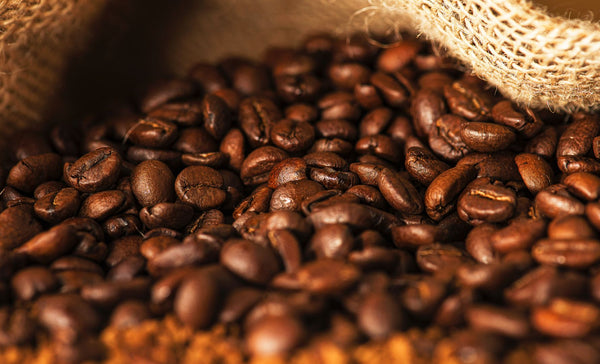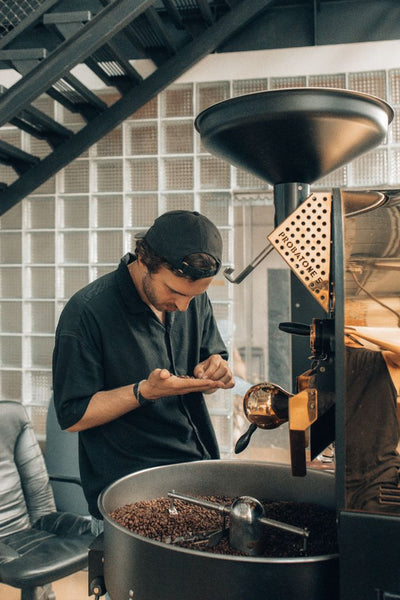Robusta vs Arabica | What is the Difference?
An exploration of coffee isn't complete without a comprehensive understanding of the two most popular coffee species - Arabica and Robusta. These two types of coffee beans, though originating from the same plant family, are distinct in taste, acidity, caffeine content and usage.
As a coffee enthusiast, understanding these subtle differences not only enhances your coffee-drinking experience, but lets you appreciate the depth and variety the world of coffee has to offer.
In this article, we will discuss the many differences between Robusta and Arabica beans, as well as how you can achieve the ideal result through home roasting.
The Origins of Arabica and Robusta Coffee Beans
Arabica–scientifically named Coffea Arabica–is the most popular species of coffee in the world. Believed to be the first variety of coffee bean cultivated, it boasts a rich history that spans over thousands of years.
The birthplace of Arabica coffee is the highlands of Ethiopia, a region known for its rich biodiversity and favourable conditions for coffee cultivation. Over the centuries, Arabica coffee has spread its roots far and wide. Today, the largest producers are located in the high-altitude regions of Latin America, East Africa, and Asia, each offering distinct soil compositions and climatic conditions that contribute to the bean's unique flavour profiles.
The other most popular variety is Robusta coffee beans, known scientifically as Coffea Canephora. This hardy variety originates from the Sub-Saharan regions of Africa, specifically Uganda and Sudan. Unlike its Arabica counterpart, Robusta coffee thrives in low-altitude areas, more resilient due to its higher caffeine content. Acting as a natural deterrent against diseases and pests, this characteristic makes Robusta a contender in regions where conditions may not favour the more delicate Arabica.
When it comes to sustainability, both Arabica and Robusta face significant challenges. With climate change and deforestation posing threats to coffee cultivation, it is important to understand that these two varieties, due to their distinct growing conditions, face unique obstacles. Arabica, for instance, is sensitive to temperature changes and requires precise conditions to flourish, making it vulnerable to climate change. Robusta, while being more resilient, is often cultivated in regions facing severe deforestation, threatening its survival.
However, addressing these sustainability issues is no simple task. It requires understanding the unique challenges each type of coffee faces and developing targeted strategies. For Arabica, this could mean exploring shade-grown coffee cultivation techniques that can help mitigate temperature fluctuations. For Robusta, sustainable solutions might involve implementing strict deforestation policies and agroforestry systems.
Both Arabica and Robusta coffee beans have a unique flavour profile, owing to their growing conditions. To support the continued existence of these delicious coffee varieties, it is important to support sustainable growing practices.
Looking for professional, delicious beans at affordable prices? The Green Bean coffee roasters in Melbourne have what you need in terms of raw, green, roasted beans, supporting all coffee lovers Australia-wide.

The Differing Flavours of Arabica and Robusta Beans
Arabica coffee beans, a favourite amongst discerning coffee connoisseurs, are often described as the more refined of the two. They offer a smoother, sweeter taste and are reminiscent of sugar, fruit, and berries. This bean is especially known for its concentration of sugar and elevated acidity levels, a taste that is often described as bright or lively. It's this complexity and subtle sweetness that sets Arabica apart and makes it a preferred choice for specialty coffees.
Robusta beans' bold character and flavour is unmissable. They possess a stronger, harsher taste, with a grain-like overtone and a distinct peanutty aftertaste. The lower sugar content and double the amount of caffeine compared to Arabica beans contribute to their bitter taste. This might sound less appealing, but for those who prefer a coffee with a kick, Robusta is the go-to choice.
When it comes to enjoying these beans, the brewing method plays a crucial role in unveiling their unique characteristics. For Arabica, methods that highlight its delicate flavours, like pour-over or French press, work best. As for Robusta coffee beans, its bold flavour stands up well in espressos or in a traditional Italian moka pot. Feel free to experiment with different brewing methods and coffee-to-water ratios to find your perfect cup.
The Differing Prices of Arabica and Robusta Beans
There's a common saying among coffee aficionados: "You get what you pay for." Arabica beans, which offer a smoother, more nuanced flavour profile, tend to be more expensive than their Robusta counterparts. But why is this the case?
Firstly, let's talk about the growing conditions of Arabica beans. These coffee plants require a very specific climate to thrive - they favour cool, subtropical conditions, with temperatures between 15 to 24 degrees Celsius. They also need plenty of rainfall, yet well-drained soil to prevent standing water.
On top of this, Arabica beans are typically grown at higher altitudes, where the soil is rich and the climate is ideal for their growth. The nature of these specific requirements means that growing Arabica beans can be a more challenging endeavour, leading to a lower yield and therefore, a higher price tag.
The flavour profile of Arabica beans also plays a significant role in determining its price. Arabica beans are often described as having a smoother, sweeter taste, with hints of sugar, fruit, and berries. This complex and delightful flavour is sought after by coffee enthusiasts and connoisseurs alike. The demand for this exquisite taste experience drives up the price of Arabica beans in the market.
However, it's crucial to note that while Robusta beans may be less expensive, they have their unique selling points. Their hardiness makes them easier to cultivate and less prone to disease, and they boast a higher caffeine content, which some coffee drinkers might prefer. The stronger, more intense taste of Robusta beans is preferred by some coffee enthusiasts, especially for preparation methods like espresso.
Caffeine Content and Health Implications
Coffee is a favourite drink for many thanks to its caffeine content. Perfect for waking you up in the morning or combatting a mid-afternoon slump, caffeine content is a pivotal factor that shapes not only the taste but also the health implications associated with each cup.
When it comes to caffeine content, it's Robusta beans that take centre-stage, boasting almost double the amount of caffeine compared to their Arabica counterparts. This not only gives an extra kick to your cup of coffee, but also has an impact on the health benefits and potential risks associated with regular coffee consumption.
The higher level of caffeine in Robusta beans serves as a natural insect repellent and fortifies the plants against pests. This high caffeine content makes Robusta a hardy species, able to withstand harsh environments and resist diseases better than Arabica. However, this strength comes with a flavour compromise. The higher caffeine content contributes to a fuller-bodied and slightly bitter taste, which may not appeal to everyone's palate.
While many of us associate caffeine with the much-needed energy boost it provides, it's essential to appreciate that caffeine can be healthy in moderate amounts. Caffeine enhances focus, improves mood and brain function, and helps with weight loss.
Arabica, while having lower caffeine content, contains a higher level of antioxidants. These compounds fight ‘free radicals’, which contribute to ageing, so lowering these in the body has been associated with lower risks of neurological issues, as well as some kinds of cancer.

The Art of Roasting Arabica and Robusta Beans
The roasting process of coffee beans is an art in itself. It has the power to mould the taste, aroma, and overall profile of the coffee. Arabica and Robusta beans–true to their many differences–also require unique roasting techniques.
Arabica beans are celebrated for their versatility during the roasting process. Whether it's a light, medium, or dark roast, these beans retain their distinct, nuanced flavour profiles, making them the favoured choice among many coffee connoisseurs. A light roast typically reveals a delicate balance of sweetness and acidity, often accompanied by a floral aroma. As the roast darkens, the acidity recedes, allowing more caramel and chocolate notes to take centre stage.
Robusta beans, however, require a slightly different approach due to their inherent characteristics. Their lower acidity and sugar content necessitate a longer roasting time to truly unlock their potential. An extended roasting process allows the natural oils in the Robusta beans to migrate to the surface, creating a rich, full-bodied, and robust flavour, resulting in a coffee with a pronounced bitterness and a woody taste.
But what does this mean for you as a coffee enthusiast? Understanding the roasting process of these beans can elevate your coffee experience. For instance, if you're someone who enjoys a smooth, well-rounded cup of coffee, a medium-roasted Arabica would be a perfect choice. On the other hand, if you prefer a strong, full-bodied coffee with a distinct kick, a dark-roasted Robusta might just hit the spot.
Frequently Asked Questions
Which coffee is healthier, Arabica or Robusta?
Although both Arabica and Robusta have health benefits, Arabica is generally considered healthier due to its lower caffeine content and higher antioxidant levels. Caffeine, while beneficial in moderation, can cause adverse effects such as restlessness and insomnia when consumed in large quantities.
Antioxidants, on the other hand, are known for their health-promoting properties, including reducing inflammation and combating free radicals. The higher antioxidant content in Arabica beans contributes to its health benefits. However, it's important to remember that the healthiest coffee is one consumed in moderation!
What bean type do popular coffee chains and brands use?
When it comes to sourcing coffee beans, most coffee shops and chains–including McDonald's, Starbucks and Gloria Jean’s–primarily use Arabica beans. The reason for this preference is primarily due to Arabica's taste - a smooth, sweet flavour with hints of sugar, fruit, and berries, and a bright acidity.
These flavours are generally more popular among those who aren’t coffee fanatics. This makes Arabica beans suitable for a wide range of coffee beverages, from the classic espresso to a frothy cappuccino or a tangy cold brew. However, instant coffee and espresso blends often contain a mix of Arabica and Robusta beans. Robusta, with its strong, robust taste and higher caffeine content, can add a potent kick to these blends, balancing out the sweetness of the Arabica beans.
Why does Arabica taste smoother despite its higher acidity?
The higher acidity in Arabica is often associated with flavours described as tangy or fruity. This doesn't equate to harshness but contributes to a bright, vibrant flavour that, combined with Arabica's inherent sweetness, results in a smooth taste.
Is the stronger taste of Robusta better for espressos?
Many people believe so, and it's frequently used in espresso blends for its crema-producing qualities and its ability to hold its own against milk and sugar. However, it's all subjective, and some prefer the nuanced flavours of an Arabica espresso.
Get Robusta and Arabica Coffee Beans Australia-Wide Online
In the end, whether it's the delicate Arabica or the intense Robusta, the world of coffee is a vast one, with each type of bean offering a unique experience. As you explore and experiment with these two varieties, you'll appreciate the complexities and nuances that each bean brings to your cup. And with that knowledge, every sip of coffee becomes an educational experience.
Whether you’re looking for green beans or roasted beans, Arabica, Robusta or a blend of the two, Green Bean Coffee has what you’re looking for. Alongside our extensive selection of beans, we also sell all the equipment you’ll need to roast coffee beans at home.
If you’re looking for a new bean for your morning cup of coffee, want to try something a little different or are interested in learning more about home roasting beans, contact us today. Our skilled and passionate team of coffee lovers is always ready to help!
